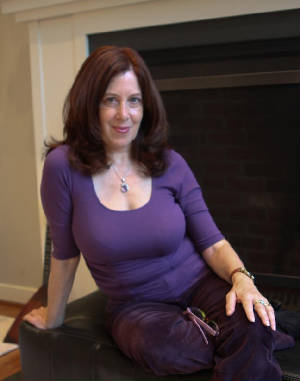
|
| That's me, Pattie Weiss Levy. |
A Modern-Day "Ima" on a Modern-Day Bimah
(With
new content posted every WEEK!)

|
|
Tuesday, October 28, 2014
A Word From the Weiss
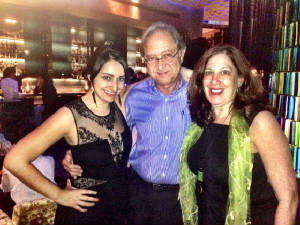 Barely a week after we’d ecstatically reunited with our daughter in Hong Kong, it was hard to believe that we already
were obliged to bid goodbye to her and that bustling city. But we would be back again soon for more adventures before we returned
home. Besides, this farewell was only temporary. Allegra would later join us in Bangkok. Barely a week after we’d ecstatically reunited with our daughter in Hong Kong, it was hard to believe that we already
were obliged to bid goodbye to her and that bustling city. But we would be back again soon for more adventures before we returned
home. Besides, this farewell was only temporary. Allegra would later join us in Bangkok.
But first we would fly to Beijing
for four days, our first visit ever to Mainland China.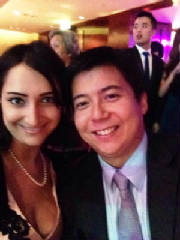
While in Hong Kong, we had entrusted Allegra and her supremely savvy boyfriend JP to oversee what we did, where we went,
and nearly every morsel that we consumed. Now, suddenly, we'd be in a brand new and unfamiliar country entirely on our own.
Well, not entirely on our own.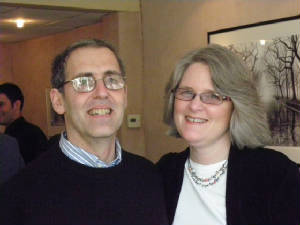
Our good friends Amy and Rich had taken a similar trip a few years earlier, and they’d spent countless hours imparting
advice about essential “don’ts” (don’t overpack; don’t drink the water), as well as equally
crucial “do’s” (do bring quick-dry underwear, do make sure to eat Peking duck there, and do be sure to bargain
for everything that you buy).
Equally invaluable, they gave us contact info for the private guides that they had
employed in both Beijing and Bangkok. And although five years had passed since their own journey, both men promptly emailed
back agreeing to assist us.
We also accepted Allegra’s recommendation of a travel agent based in Hong Kong.
And although I ultimately opted to choose all but one of our hotels myself, I let her book our flights and arrange for us
to be picked up and returned to each airport we'd visit.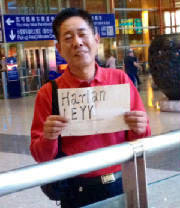
My husband seemed a bit peeved to learn that I’d shelled out extra dough for the luxury of having all of that
private transportation. But when we arrived in Beijing after dark not speaking one word of the local language, it was an incalculable
comfort to be met by a man with a sign bearing our name and whisked safely and effortlessly away.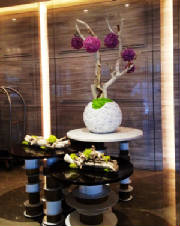
No less gratifying was our arrival at our hotel in a centrally located area of the city known as Wangfujing. I’d
chosen the Beijing Hilton because it was within walking distance of many of the city’s main attractions, but also because
we’re members of the chain’s Hilton Honors program. I figured this might make us eligible for a room upgrade.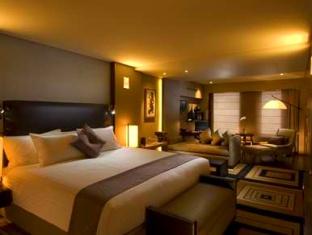
Indeed, that upgrade was bestowed without our even asking. Hiltons tend to be modern, well-run hotels, but when we opened
our door on the 11th floor, I was, well, floored. Our room was not merely a room; it was a plush cavernous suite more than
50 feet long, with an immense walk-in closet, separate his and hers sinks in the mammoth marble bathroom, and a spacious living
room area with a sweeping view of the city.
OMG, was all that for the two of us? Or maybe us and a small developing
nation?
Speaking of which, when it comes to mainland China, forget “developing nation.” Not to mention
“small.”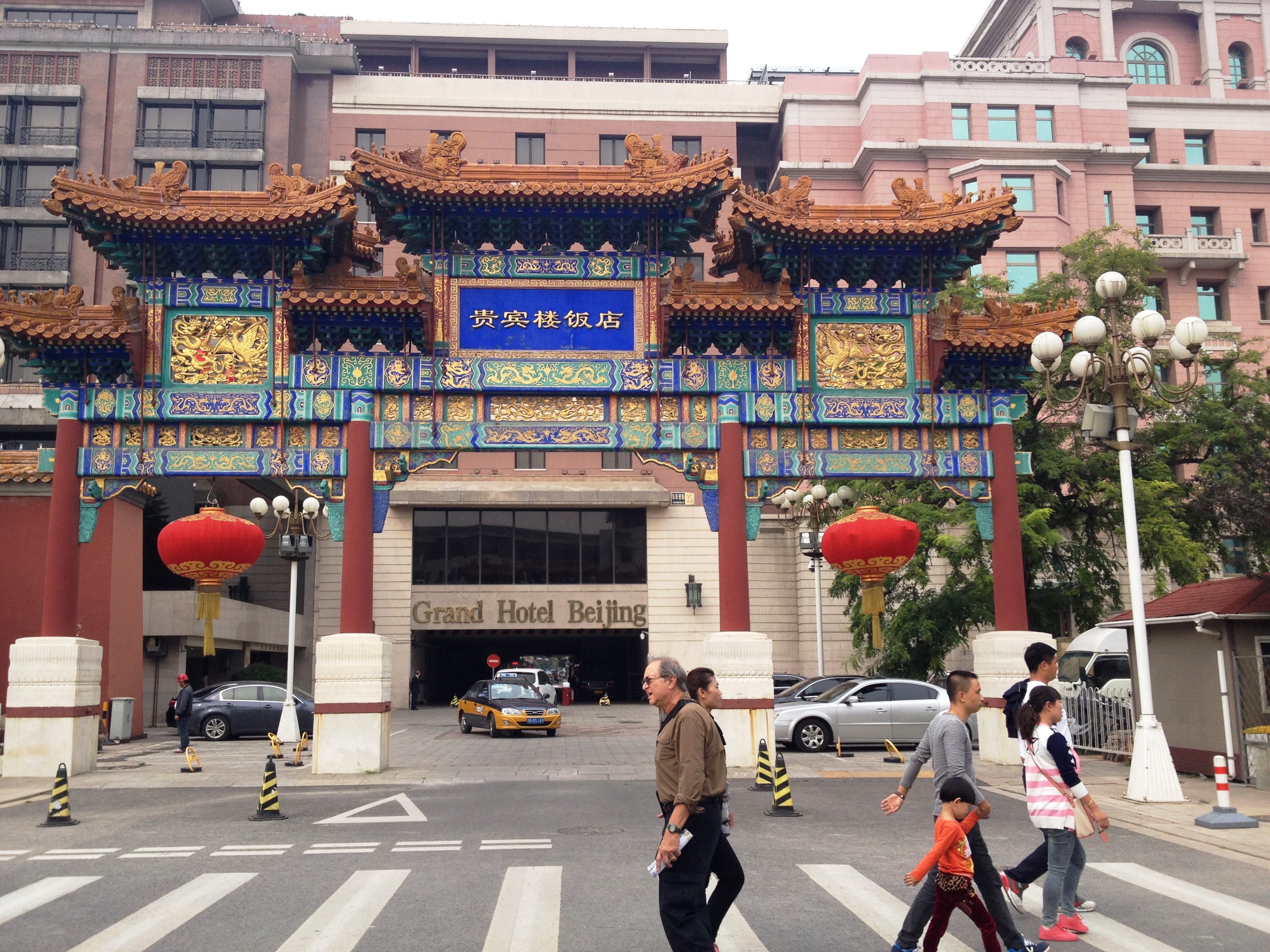
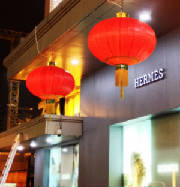 Little that we saw in Beijing was
humble. Almost everything, rather, was huge, from the many palatial hotels (which all looked like they’d eaten one of
our American hotels for breakfast) to the glitzy car dealerships lining many of the six-lane thoroughfares traversing the
city. Little that we saw in Beijing was
humble. Almost everything, rather, was huge, from the many palatial hotels (which all looked like they’d eaten one of
our American hotels for breakfast) to the glitzy car dealerships lining many of the six-lane thoroughfares traversing the
city.
Meanwhile, everyone (not just tourists like us) was shopping their tucheses off.
Asked for recommendations
about where to eat dinner, the concierge sent us to an enormous shopping mall next door. Fly all the way to China and
then eat dinner in a mall?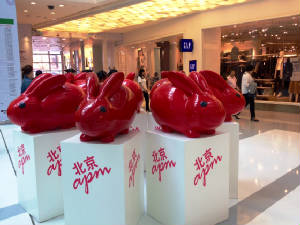
Yup. And it turned out the options in there were endless.
Forget whatever you imagine about Communist
China. That six-story behemoth with giant red rabbit sculptures inside the entrance boasted nearly every Western mall store
known to man, from The Gap and H&M to Zara, Sephora, and Forever 21.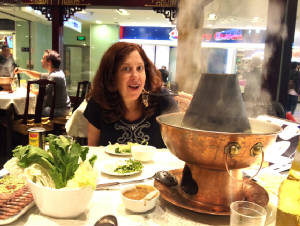
The dining options were similarly copious. We ended up at a “hot pot” spot, a culinary phenomenon enormously
popular with the Chinese (although with my husband not so much). They place a humungous steaming cauldron in the center of
your table and you order from a vast assortment of ingredients, including vegetables, noodles, and meats sliced paper thin.
You dip these items into bubbling broth (much the way we eat fondue), then fish them out with chopsticks.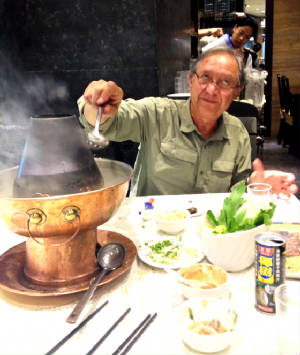
My hubbie enjoyed the ingredients that I chose well enough. He just didn’t seem to appreciate having to cook his
own dinner.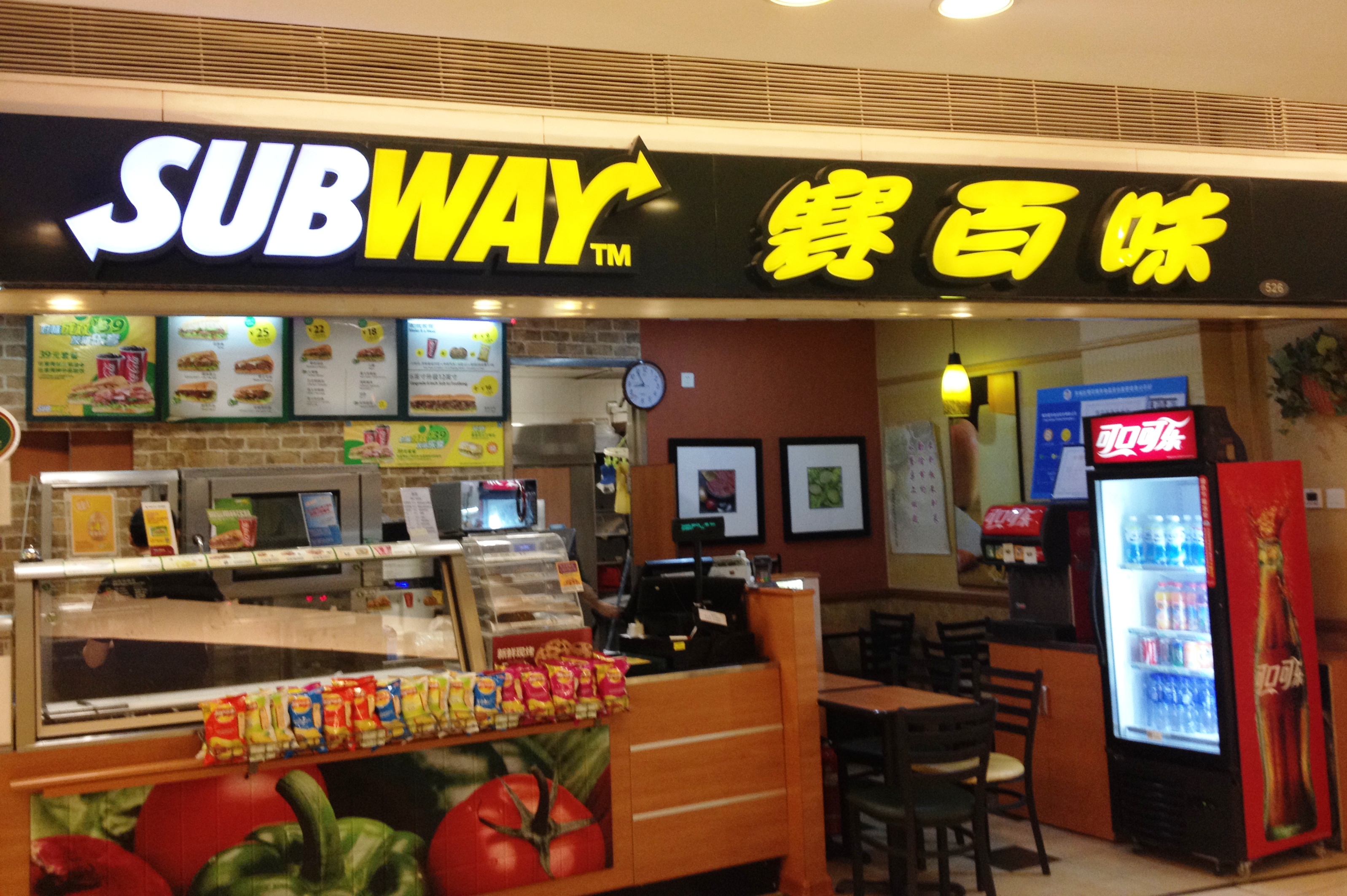
He appreciated even less that at the Haagen-Dazs booth (yes, they even had that), two tiny scoops went for 59 Chinese
RMB (about $10). We agreed to forego this splurge in favor of cheap sundaes at McDonald’s (yes, they had that too, as
well as Subway).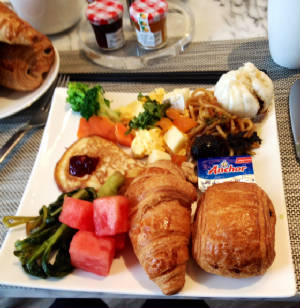
The next morning, our hotel provided the most bountiful breakfast buffet I’ve ever seen, including eggs made to
order, pancakes, waffles, French toast, quiche, chocolate croissants, lox, and assorted cereals and cheeses, plus innumerable
Chinese delicacies including fried noodles, dumplings, stir-fried vegetables, and several kinds of congee.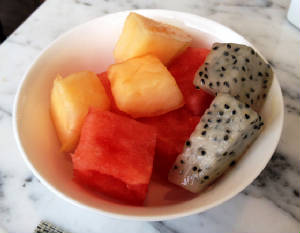
Most novel of all were the iced bottles of freshly squeezed cucumber, carrot, and watermelon juice, along with fresh
fruits, including one I’d never seen before – dragon’s eye fruit, sliced open to reveal a lily-white melon
studded with teeny black seeds. Yum!
After washing it all down with multiple cappuccinos made to order, we
set out for the city’s top tourist attraction, The Forbidden City.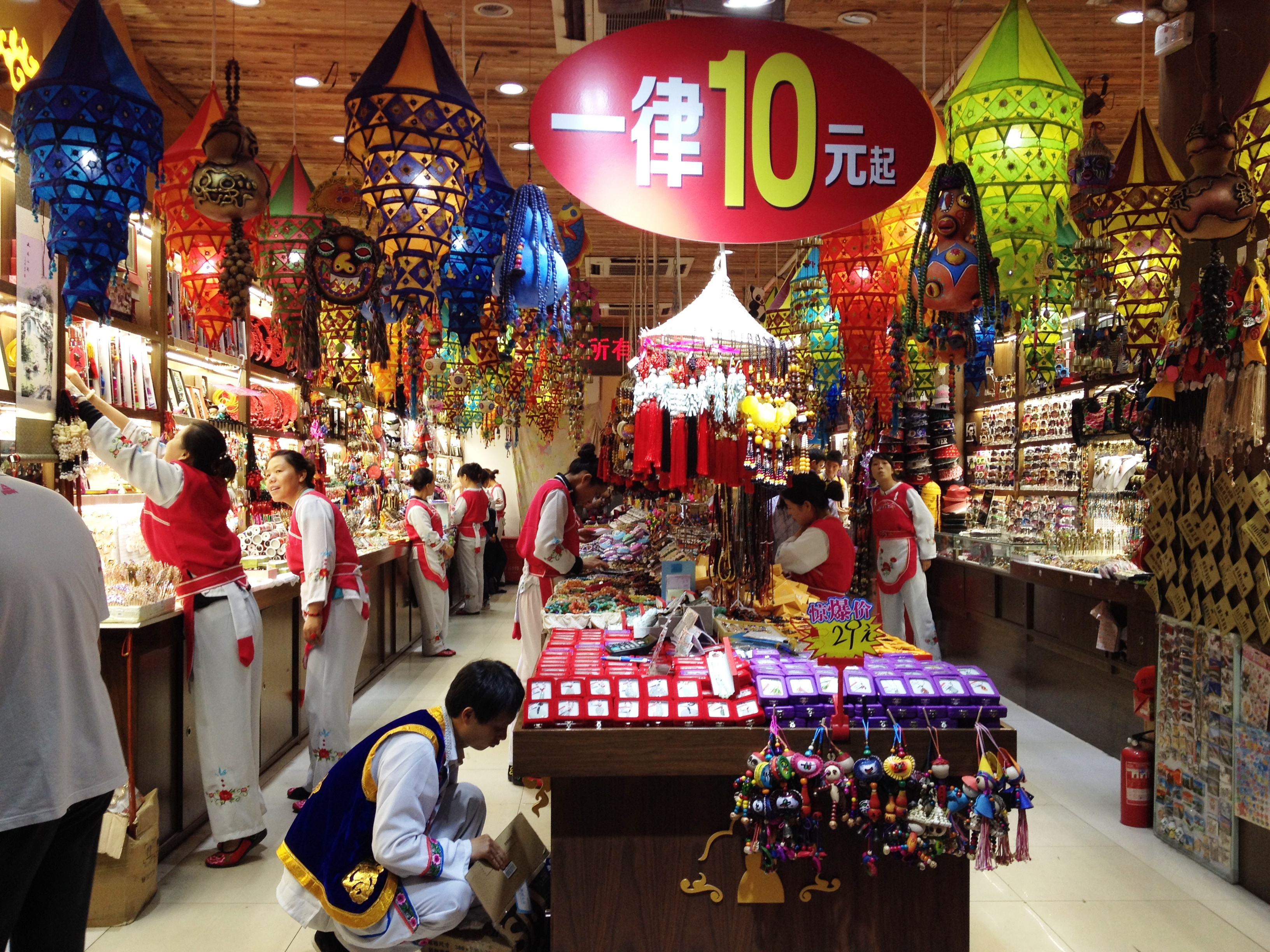
It was just a short walk away. But we never made it.
The road leading there was lined with shops selling cheap souvenirs,
from colorful embroidered purses and satin robes to folding fans, silky scarves, tote bags, t-shirts, and canisters of loose
tea with rather novel names (like “Decision Markers Eyebrow”).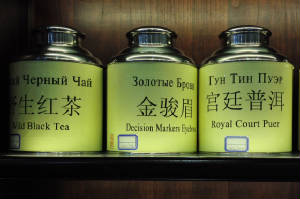
All of these items were at least potentially cheap. As our friends had so aptly conveyed, prices were highly
negotiable, so I let my husband handle all transactions. Unlike me, he loves to hondel – maybe a little too
much.
At one shop, while I selected a bejeweled peacock-shaped hairclip to bring Allegra,
he got to chatting with the owner after they settled on a price (around a buck).
Her English was surprisingly fluent,
and she seemed ecstatic about the chance to hone her skills even more while comparing notes about American TV. “Breaking
Bad!” she exclaimed breathlessly, adding, “Prison Break!”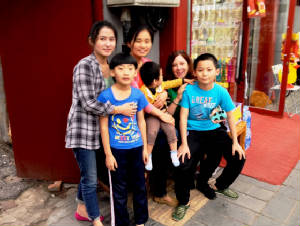
Before I knew it, she had summoned her whole family to pose for photos with “Grandma,” as she
dubbed me, including her niece, an adorable toddler named Nu-Nu. Then we bid them a fond farewell. But Chinese goodbyes are
a lot like Jewish ones, apparently. That is, we said it and left, but our new friend wasn’t ready to let us go.
Instead, she kept pace with us for blocks, babbling away until we happened to reach an art gallery in which both her
husband and brother were selling their paintings.
Imagine that!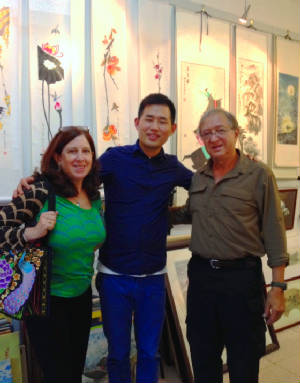
We agreed hesitantly to go in and say a quick hello, but their works of art – traditional
watercolors painted on white silk scrolls – turned out to be so lovely (and so reasonably priced!) that we actually
agreed to buy two. Both of our choices were by the woman’s husband, though, and when her brother expressed profound
insult at having his artistry passed over, we caved in, rather than creating an international incident, and took two of his,
too.
Sadly, after all of these detours, by the time we reached the Forbidden City it had already closed for
the day. So we headed to Tiananmen Square.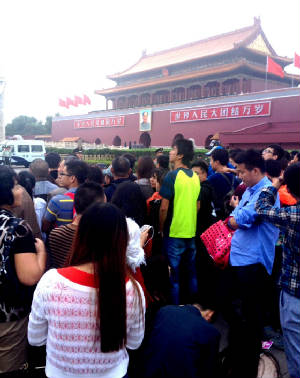
You may know about this vast landmark, named after the Tiananmen Gate (“Gate of Heavenly Peace”), from the
infamous student demonstrations held there in 1989. But it’s now mostly a flower-lined promenade popular with tourists
and residents alike – so much so that hundreds of people were lined up to go through Security at the entrance.
We weren’t quite sure how
to proceed until an older Chinese fellow with a toddler on his shoulders came to our rescue and told us to stick with him.
That toddler, I suddenly realized, was none other than Nu-Nu, and the man was the father of Ms. Breaking Bad, an
artist in his own right (yet mercifully with no paintings in tow to sell).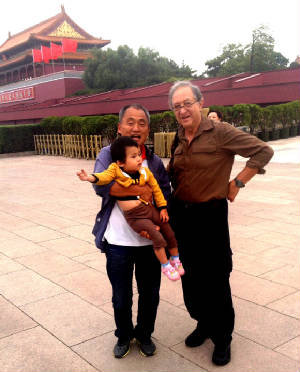
Of all the 21 million people who live in Beijing, we just happened to walk into him? Was this just sheer coincidence
or bashert (Yiddish for meant to be)?
Who knows? After finally making our way through the sea of people,
we prevailed upon some fellow tourists to snap a photo of us in exchange for our snapping them.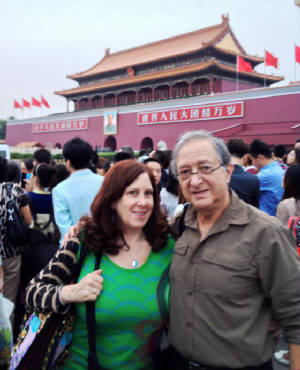
Having been cautioned by our friends, I made sure to watch out for pickpockets. But that didn’t mean my wallet
was safe.
As we made our way out, we suddenly were greeted by two Chinese women who seemed overjoyed to meet us.
They said they were schoolteachers visiting from a town three hours away and asked if they could walk along with us to practice
their English.
Soon, they weren’t content to just walk with us, though. Wouldn’t it be better to go somewhere
and get better acquainted over tea?
By then it had grown dark, and we were more inclined to go out for dinner instead.
But after walking all day, I was tired. And thirsty. Why not sit down for a nice cup of tea?
Besides, in the interests of diplomacy,
it seemed rude to refuse their kind invitation. I soon came to realize, though, that diplomacy was not exactly their own cup
of tea.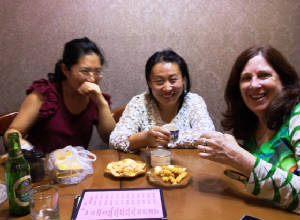
The older of the two, who said that she taught English to young children, kept making comments that might be considered
blunt at best. After asking to see pictures of our family, she said that our daughter looked Indian. Another relative, she
noted, looked Mexican. But most of all she kept wondering aloud why my husband appeared to be so much older than I am (because
at 11 years my senior, he is so much older than I am).
What she may have lacked in tact, though, she
more than made up for in bravado, or whatever the Chinese equivalent is for chutzpah. She pulled us into a tiny tea
house, where we were given a private room, then ordered a pot of tea for us all to share, along with two plates of crackers
to snack on. A pot would be more economical than single cups, she explained.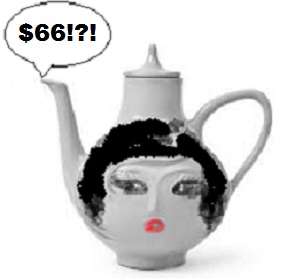
Economical? Not quite. When the bill finally came, they made no move for their own wallets, although the tab, including
a beer for my husband, amounted to $66.
Were they really innocent school marms on holiday from far out of town,
or were they crafty locals in cahoots with the tea house? Feeling taken advantage of, maybe even duped, we were more than
ready to bid our new friends a not-so-fond farewell.
But hearing that we were headed for dinner, they offered to show
us the most famous Peking duck house in all Beijing and insisted on escorting us there personally. When we arrived, they insisted
on walking us in and offered to help us order. But my husband, no longer minding his P’s and Q’s, assured them
we could take it from there.
Or could we? This so-called famous restaurant turned out to be a humble hole in the
wall where they barely spoke a word of English. Only with great effort were we able to communicate that we wanted half a duck
(a whole one would be too much for two). As for vegetables, they were only available with a hot pot. My husband flatly refused.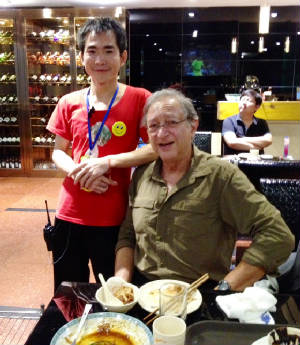
Somehow, though, by writing out what he wanted to say, he was able to carry on a lengthy conversation with our affable
young waiter, who looked like an Asian Adam Levine. The waiter looked up every word on his phone, one by one, and pretty soon
they were chatting about everything from the fellow’s hobby (collecting coins) to sports.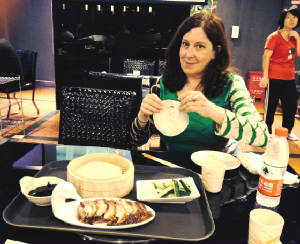
Best of all, whether or not the place was famous, their duck – served the traditional way with thin pancakes,
hoisin sauce, and shredded scallions – was absolutely divine.
Early the next morning, we were picked up at our hotel by our friends’
trusty guide David. When I’d emailed him a month earlier, he had responded almost instantly that “David is right here in Beijing waiting for you.” (His real name, of course, was not David. That was simply the
moniker that had been bestowed on him years earlier in a language class, when the teacher had chosen new identities for everyone
in the room, declaring, “You’re Tom. “You’re Dick.” “You’re David.”)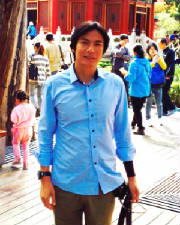
Whatever his name, for the next two days we were thrilled to call him our guide. His English was flawless, and
his manners, driving, and camera skills impeccable. Best of all, as a former high school teacher who now worked full-time
as a professional tour guide, his knowledge of Chinese history and tourist sites was seemingly inexhaustible, particularly
about our first destination, the Great Wall of China.
Initially, our travel agent had offered to send us on a tour of the Great Wall departing at 8 a.m. We had declined,
on the grounds that we are not morning people and didn’t want to see anything at 8 a.m., least of all a wall. She countered
that we needed to leave that early because the Wall was four hours away from Beijing. To which my husband replied that he
wouldn’t travel that far to see anything – especially a wall, however great – and that he’d be perfectly
happy just to see a picture of the wall.
Well, having now seen the Great Wall, in person, let me tell you a thing or two.
Number one, the section of the
wall we went to, called Mutianyu, was no more than a 90-minute drive from downtown Beijing. Number two, they don’t call
the wall “Great” for nothin’. It may be the single most incredible thing I’ve ever seen in my entire
life, and it was well worth flying all the way to Beijing (or even to the moon, if necessary) to visit.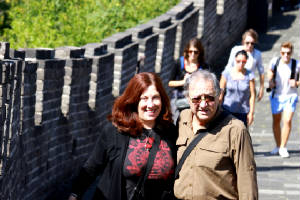
Not all portions of the wall you can see today are original parts, and not all of the Wall that originally existed still
remains to be seen. However, some areas are well over 2,000 years old. And although many now lie in disrepair, about 5,500
miles still remain.
Taking many dynasties to complete, the Great Wall was created to help protect the Chinese Empire by keeping
out the Huns, Mongolians, and other warlike neighbors.
What is difficult to appreciate, unless you are actually there, is that the wall is set high up in the
mountains, where it snakes circuitously throughout the natural terrain.
Those mountains themselves are vibrant green
and utterly magnificent to behold. Yet even more astonishing is that the building materials used in construction, including
massive stones weighing hundreds of pounds apiece, were lugged up there by hand.
No wonder many people evidently
perished on the job. Since there was nowhere to bury them so high up in the mountains, workers who died on the job –
and there were many – were often buried inside the wall, David told us. “So it is said that the Great Wall is
not just the largest wall in the world, but also the world’s largest cemetery.”
Yet hiking along a meandering stretch for an hour or so, I wasn’t struck by any maudlin sense of death. Rather,
I was overcome by a new appreciation for the enormity of life, the immenseness of history, and how small in the scheme of
things I really am.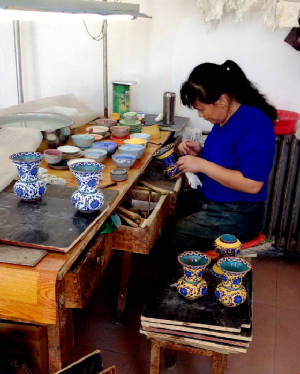
Continuing our history lesson after a bountiful Chinese lunch, David took us to a nearby cloisonné factory, where
we viewed the ancient art of making exquisite vases and other decorative objects. The process – which involved gluing
wire in intricate patterns onto copper vessels and then painting them in eight separate layers – was so elaborate, and
the colorful results so dazzling, that I was soon dying to buy one.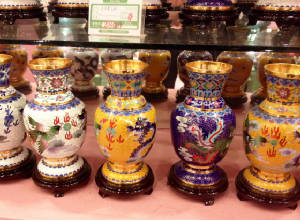
But they were very expensive and my husband restrained me, asserting that I didn’t really need a vase because
they don’t do anything other than sit around on the shelf.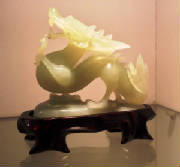
No matter. I stewed all the way to our next stop, a jade factory, where we learned how traditional Chinese jewelry,
carved dragons, and other such figurines were made.
I didn’t stint myself there.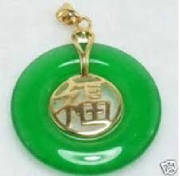
The next day, despite our preference to sleep in, we started off bright and early because we had plenty of ground to
cover, much of it hallowed for the Chinese.
First stop was the 600-year-old Temple of Heaven, a round structure
set in a vast park, which has the distinct distinction of being the oldest wooden building in the world.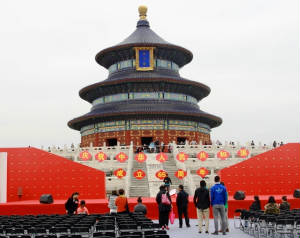
This tall temple was painted a deep crimson shade, far deeper than the ruddy wedding gown worn by a bride-to-be whom
we saw posing beside it. Many couples come there for wedding photos, David noted, and Chinese brides favor red, not white.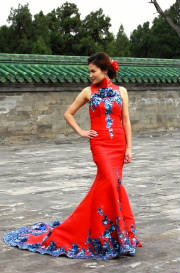
“Red is a lucky color for the Chinese because it is the color of blood,” he explained. “We use blood
to ward off evil spirits.”
There were no evil spirits evident at the Forbidden City, the splendid palace spanning
180 acres and featuring 980 buildings, which served as home to 24 emperors for nearly 500 years – just thousands of
fellow tourists from all around the world.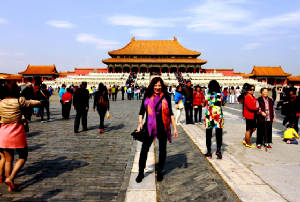
The city was said to be forbidden because no one was allowed to enter without the emperor’s permission. Commoners
were banned until the Chinese Revolution of 1911.
Speaking of “forbidden,” the emperor lived there with
his wife and 72 concubines, David said. Senior officials were permitted in for ceremonies and government business, but no
men other than the emperor were allowed inside the inner court, where the concubines lived, with the exception of the many
eunuchs chosen to run the premises. (The emperor evidently didn’t welcome any competition in the romance department.)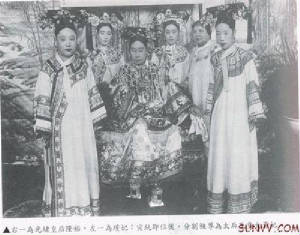
As for the concubines, they were not necessarily chosen for their stunning looks. Those in the Forbidden City were required
to be of Manchurian descent, and judging from pictures that David had seen, he believed that many were far from ravishing.
Far more beautiful courtesans were housed separately at the Summer Palace, which the emperor visited regularly year-round
by voyaging via a manmade canal by dragonboat.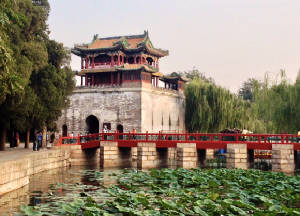
That seaside Shangri-la was our next stop, and the most dazzling destination of all. No wonder this serene hideaway
was where the emperor’s mother also chose to reside. Did he make his way there so often to patronize his spare gal pals,
or to hang out with dear old mom? Who knows? But David knew plenty about one particular mother, the most famous of all, known
as the Empress Dowager Cixi.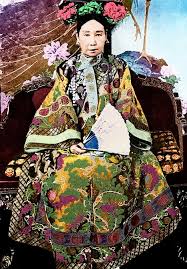
Initially a mere concubine herself, she rose steadily in the ranks to actually rule herself for 48 years after her husband
died in 1861, when their son was only 6.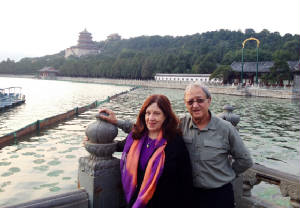
David’s eyes lit up like Chinese lanterns as he described the luxurious lifestyle that she enjoyed. Every day
she bathed in milk, he said, and ate pearl powder, believed to beautify the skin. And every night, she had 128 different dishes
prepared for her dinner and never let anyone know which one was her favorite, lest she be poisoned, he said.
Nice as it is being a nice Jewish
mom, maybe nice emperor’s mom would be nicer.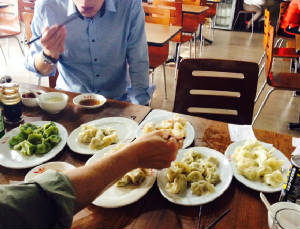
But 128 dishes a day? Talk about wretched excess! It was daunting enough when David took us to a popular dumpling house
and ordered eight different varieties including egg and tomato, which were surprisingly delicious.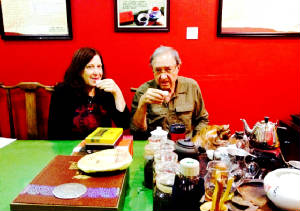
From there, we went to a government-owned tea factory, where we tasted many varieties of the brew, including oolong,
lychee, Emperor’s pu-eh, and a fruity concoction called Sweet Lover… and we loved them all so much that we purchased
some of each.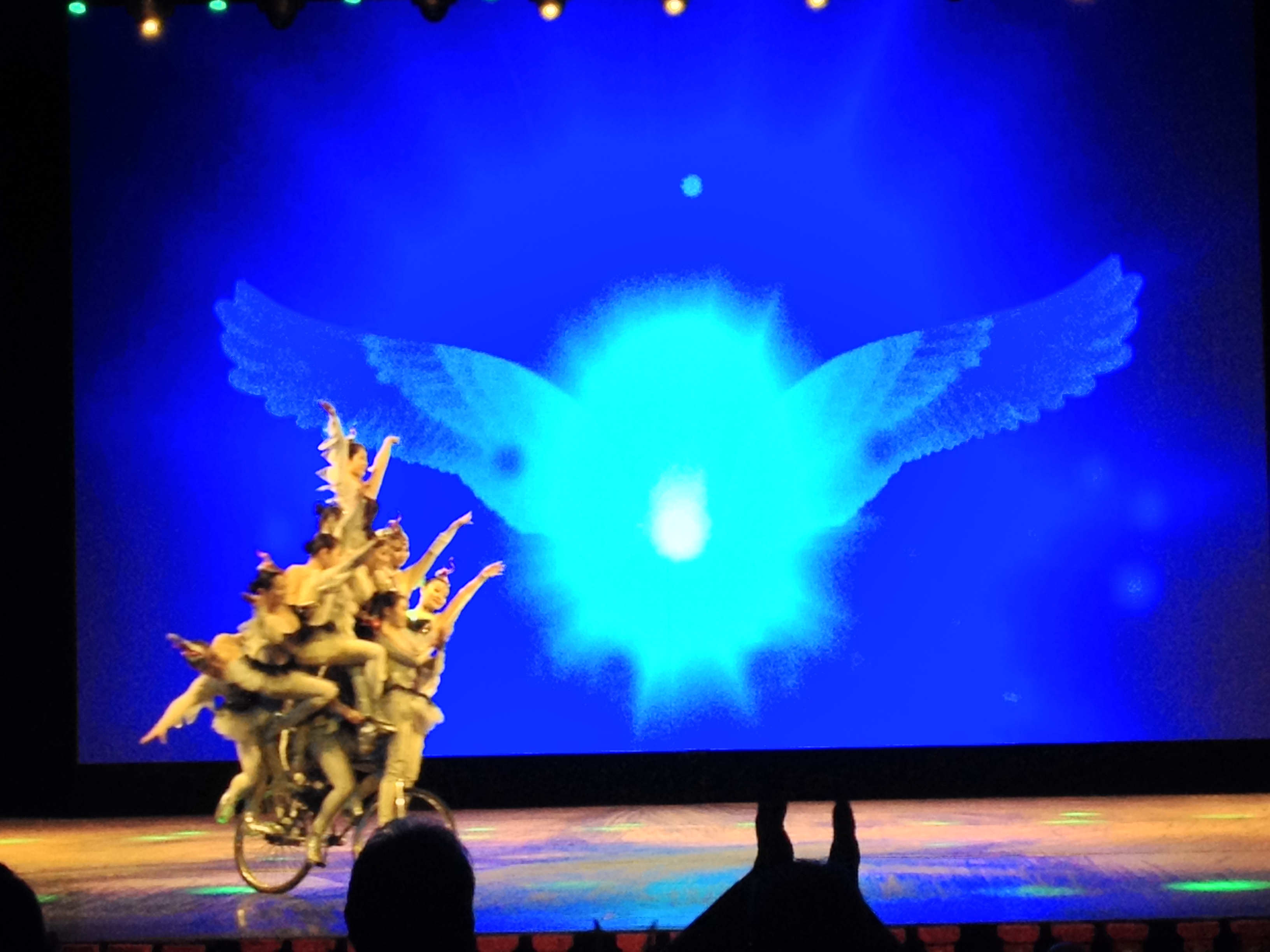
Then it was on to a Chinese acrobat show, featuring high-wire acts, a pyramid of dancers riding a single bike, and eight
men circling inside a metal cage on motorcycles.
Talk about full days! Not to mention unforgettable. But the one
thing I hope I never forget is the advice that David gave us. When we told him about our earlier encounter with the two ladies
who’d taken us to tea – or maybe just taken us – he shook his head.
“Here’s my suggestion
to you,” he said. “Never follow the stranger.”
We woke up the next morning to chilly temperatures
in the 50s and torrential rain. No matter. Sadly, it was already time to pack and leave for the next leg of our trip.
But first we needed to attend to
one important piece of unfinished business.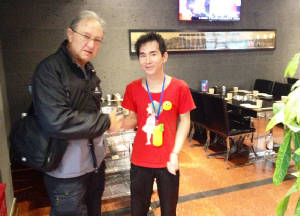
My husband insisted on retracing our steps to the not-so-famous duck house to track down his new best friend. He’d
felt terrible that we hadn’t had any American coins to add to the fellow’s collection when we ate there, and he
wanted to deliver a few.
I thought it was a little nutsy, given our limited time, but I also thought it was
sweet.
So, I am happy to report, did the waiter.
Only then did we go shopping for a few last
souvenirs to bring home: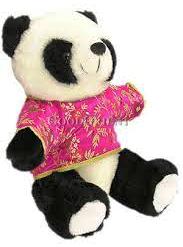
A little stuffed panda in a pink satin jacket for Allegra.
A black T-shirt embellished with Chinese symbols
for Aidan.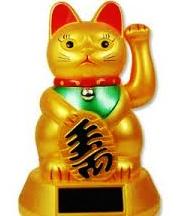
And a plastic golden cat with a waving paw, considered a symbol of good luck.
Then, in a souvenir shop, I took
a shine to an ivory silk scarf printed all over with one large, black repeating Chinese character. The salesgirl said that
it cost 999 yuan (about $163), which sounded beyond exorbitant.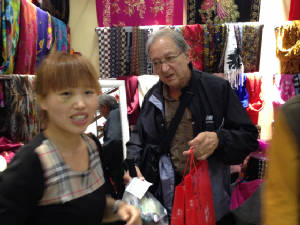 But when my husband balked at the price and began walk out, the salesgirl called after me, “You have a very clever
husband,” and let it go for a tiny fraction of the price (though still probably too much). But when my husband balked at the price and began walk out, the salesgirl called after me, “You have a very clever
husband,” and let it go for a tiny fraction of the price (though still probably too much).
He was so flattered that he bought
a second scarf for one of our friends back home.
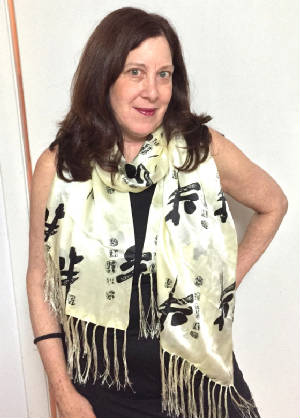 When we got back to our hotel to
collect our luggage, I showed a staff member my purchases and asked what the Chinese character on my scarf meant. When we got back to our hotel to
collect our luggage, I showed a staff member my purchases and asked what the Chinese character on my scarf meant.
She turned it in various directions,
studying the markings carefully.
“It is an animal,” she finally said.
“What kind of animal?”
I asked, intrigued.
“It is the animal ‘cow,’” she replied, explaining that cows were highly valued
in ancient China for their ability to help with farm work.
“Cow?” I asked incredulously, more than a little deflated.
“That’s it? Are you sure? It doesn’t mean something nice, like, you know, ‘Long life,’ or ‘Good
luck?’”
“No,” she asserted earnestly. “Just cow. But madam, it is an excellent cow, and it means you are excellent,
too.”
I’m not convinced that either is true. But we had a truly excellent time in Beijing.
Next week, my Asian adventures continue at our next stop – Bangkok.
11:55 pm
Friday, October 17, 2014
A Word From the Weiss
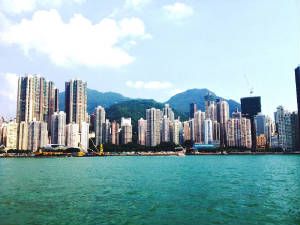 The temperature was already tiptoeing past 90, with humidity hefty enough to wilt a rock,
when we landed in Hong Kong at 5 a.m. after a grueling16-hour flight. I’m not complaining, mind you. The only people
who have any right to complain in this scenario are the ones who heard me screaming when I first spied my daughter’s
face… and given the decibel level of my audible joy, that may have included all 7 million or so residents of Hong Kong
and half the population of mainland China. The temperature was already tiptoeing past 90, with humidity hefty enough to wilt a rock,
when we landed in Hong Kong at 5 a.m. after a grueling16-hour flight. I’m not complaining, mind you. The only people
who have any right to complain in this scenario are the ones who heard me screaming when I first spied my daughter’s
face… and given the decibel level of my audible joy, that may have included all 7 million or so residents of Hong Kong
and half the population of mainland China.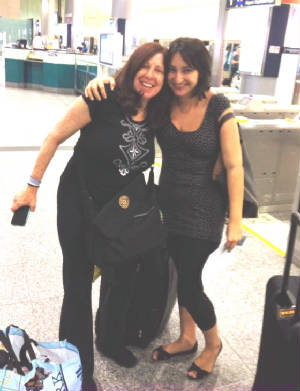
Then again, who could blame me? Allegra had been halfway around the globe since early July, ever since she had begun
singing at the Hong Kong Four Seasons hotel, a three-month engagement that had since been extended through January. Although
we conversed daily on WhatsApp, and even faced off occasionally on Facetime, never had we been apart for close to that long
since the day she’d been born over 24 years ago.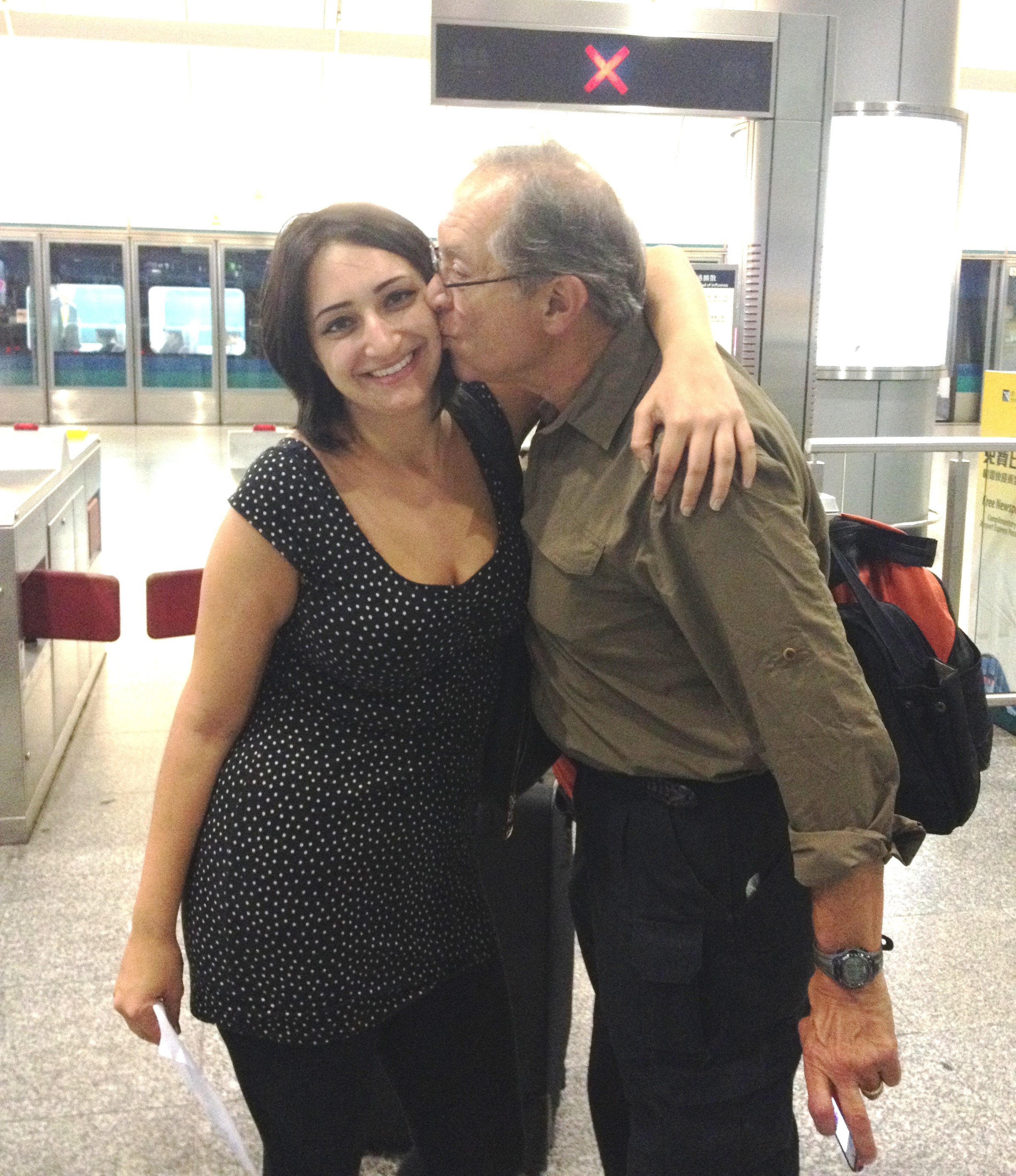
Having never been to Asia, my husband and I had decided to treat ourselves to three whole weeks in the so-called Far
East, during which we’d visit Beijing and Bangkok as well. Yet given that our daughter was stationed halfway around
the globe, we planned to spend the majority of that time in Hong Kong.
Life is short. Vacations -- even lengthy ones
like this -- are shorter. We wanted to see as many parts unknown as possible. But mostly, being a nice Jewish mom and
dad, we wanted to see her.
The feeling was apparently mutual, because despite my endless entreaties she had stayed
up all night to meet us at the train station holding a homemade welcome sign.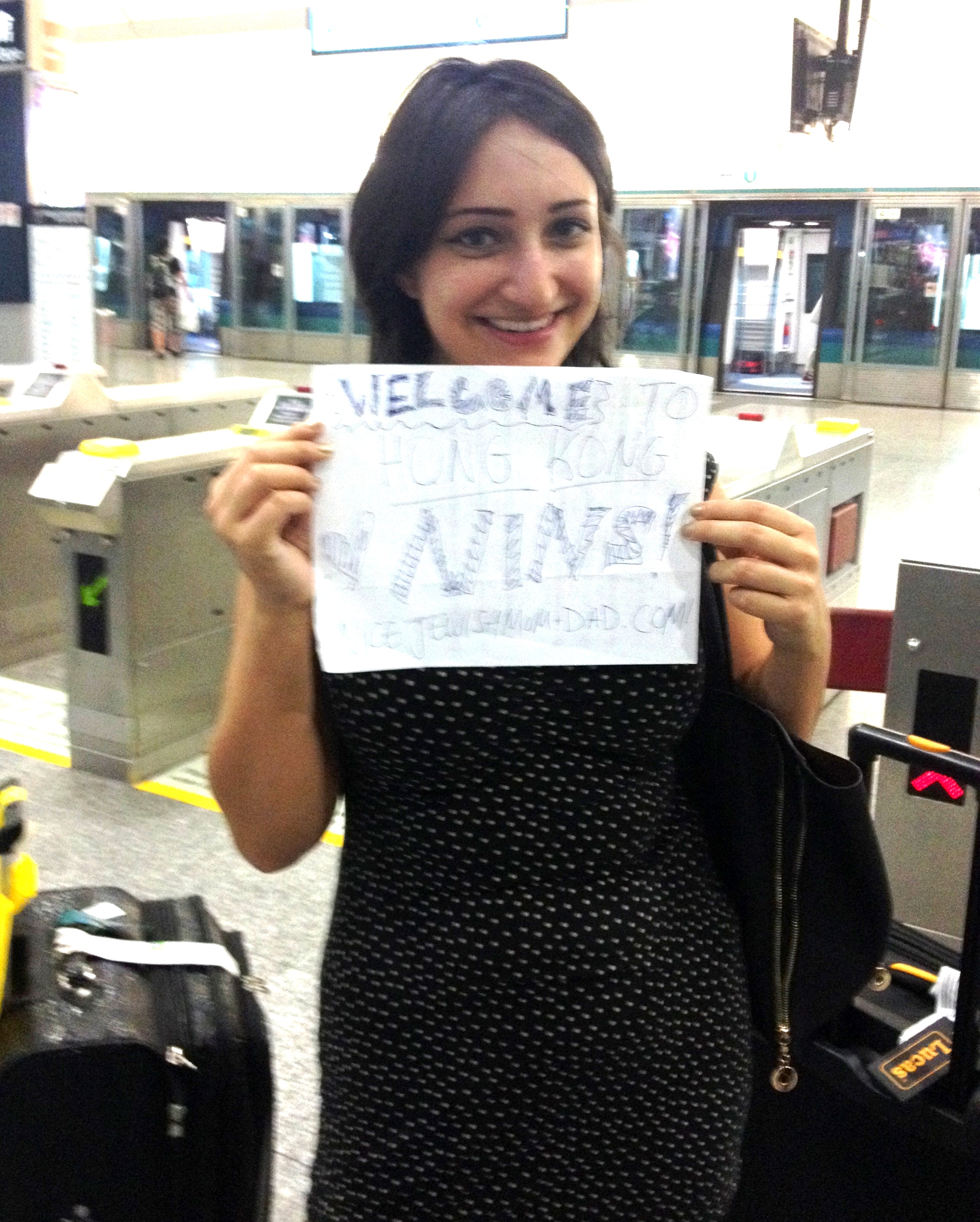
After taking turns embracing our long-lost and much-missed child, we took a cab to her apartment for a much-needed nap.
Then, since it was still too early to check into our hotel, we set off to meet Allegra’s new boyfriend over lunch
at their favorite dumpling place.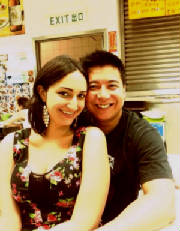
She and JP had first met soon after she had arrived. He had gone to college at Oxford, in England, with Tom, the son of my husband’s
best friend from prep school. Knowing that JP had recently returned to Hong Kong after living in Europe for many years, Tom
had asked JP to please look in on Allegra.
Looks like he liked what
he saw.
We, meanwhile, had been looking at him only in the occasional photos that Allegra posted on Facebook. So
it was a delight to discover that he had not just a charming British accent, but a radiant smile that truly lit up the
room and a magnetic personality to match.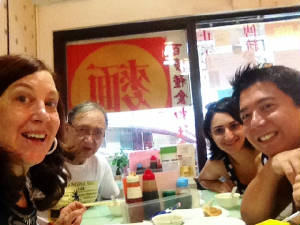
It didn’t hurt that he was fluent in both Cantonese and Mandarin, along with English, German, and other languages,
no doubt. Never mind that most menus offered basic English translations. We were happy to let JP and Allegra order food for
us, give our address to cab drivers, and take charge of nearly everything else that might get lost in translation for the
duration of our time together.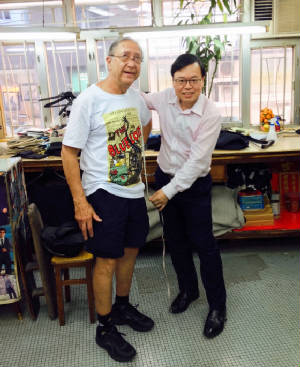
That included taking a trip to JP's tailor after lunch because my husband wanted to order a custom-made suit,
something that we’d been told was de rigueur in Hong Kong. We figured we should get him measured asap, so that
it would be ready by the time we left.
He’d never had anything made to order before, and it was fun picking
out both the fabric – a dark pinstriped cashmere-wool blend – and silk lining in a rich claret red. Only then
did we learn the price, which was not exactly the bargain that we’d anticipated. No matter. Life is short, as I said,
but the sleeves and pants would not be. The finished product was guaranteed to be a perfect fit.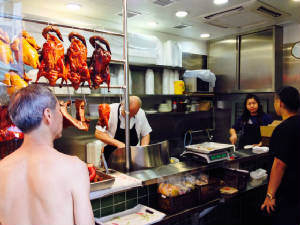
Afterwards, we strolled back to our hotel, which Allegra said would be a 15-minute walk but ended up taking well over
an hour because we kept stopping every five feet or so to gape at something we’d never seen before.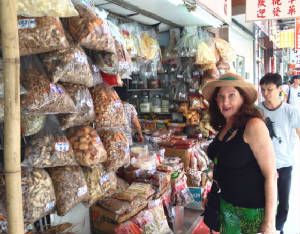
The streets were teeming with open storefronts purveying everything from
dried fish, aromatic spices, and raw or roasted meats and poultry to ornately carved coffins and T-shirts printed with oddly
distorted English phrases.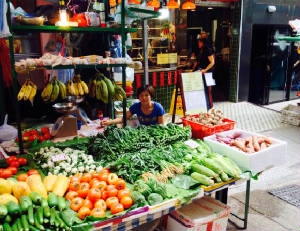
“Rolling Stom,” read one.
(Spell-check,
anyone?)
But make no mistake. Regardless of its many touches of quaint, local flavor, Hong Kong is a booming metropolis even
more upscale and modern, in many ways, than New York. Shopping malls and designer boutiques offering Western luxury goods
abound. The residents, particularly women, are almost aggressively stylish, their impossibly flawless sub-zero-size physiques
adorned in high heels and lavishly color-coordinated get-ups.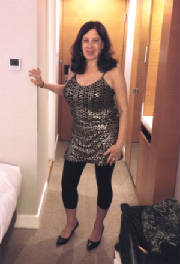
By late afternoon, we were ready to pass out from the withering heat and humidity, but it was time instead to get all
dolled up for the moment that we’d been breathlessly anticipating for months.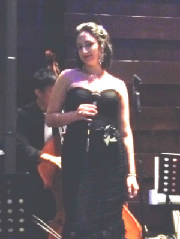
As the resident singer at the Four Seasons, Allegra's duties consist entirely of performing every Friday and Saturday
night at Blue Bar, a posh club widely considered to be the top jazz venue in Hong Kong. I know – tough job, but somebody’s
gotta do it. Somebody in high heels and a glitzy evening gown. And that somebody is my little goyl.
We normally attend most of her performances
in NYC, so it had been agonizing to know that she’d been singing in this classy place for months and be unable to go.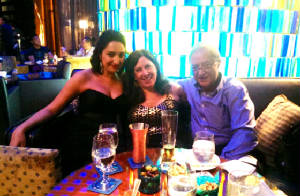
Yet let me tell you what was even more agonizing: to be there at last, in a setting even more glamorous than I had ever
imagined, and be unable to keep my eyes open!
After helping ourselves to the bar’s lavish spread of complimentary
hors d’oeuvres, we were welcomed warmly by the management and members of the Bob Mocarsky Trio, the top-notch jazz band
with which she performs. I was so thrilled to view them in the flesh after seeing them only on Facebook that I could hardly
contain myself.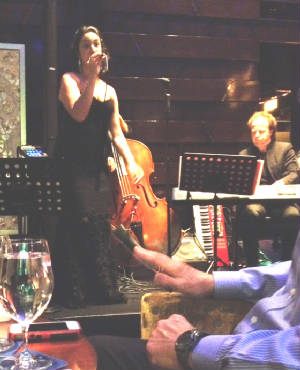
It was also a thrill to discover that after performing there regularly for many weeks, Allegra sounded better than ever
(if you ask me).
But her gig spanned five full hours, from 8 p.m. to 1 a.m., and between the 16-hour flight
and the 12-hour time difference, even Krazy Glue couldn’t have kept my eyelids from drooping.
It made no difference that I eschewed
the club’s many fancy martinis in favor of a lotus-flavored mocktail.
Fortunately, we would get to see her
perform four more times before we left.
Unfortunately, my eyes would have to stay unglued a little longer, because when we returned to our hotel at 2 a.m.,
our air-conditioning was kaput and the room was sweltering.
On Allegra’s advice, we had booked a place a block from her
apartment called The Traders, operated by a chain called Shangri-La. Whether or not the Four Seasons was within our budget
(make that a big NOT), we wanted to stay as close to her as possible.
The Traders (which has since changed its name to The Jen) was ultra-modern and comfortable, but not without a/c. The management
sent up a technician, who banged loudly till 3 a.m., to no avail. At that point they offered to move us to another room, but
I was too beat to move a muscle, let alone a suitcase. So they vowed to repair it the next day, and to compensate for
our inconvenience upgraded us to eat most of our breakfasts in their exclusive top-floor club room overlooking the harbor
below.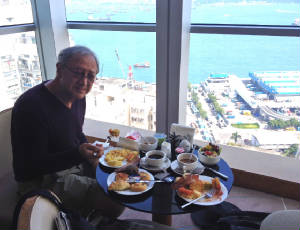
It’s hard to say which was more divine – the vast Western and Asian breakfast buffet (including eggs, lox,
quiche, assorted croissants, fried noodles, fresh fruit, and the Chinese breakfast food of choice, a thin gruel called congee)
or that gorgeous room and view. But it would be safe to say that we got over our disgruntlement real quick.
We
also didn't mind letting Allegra
and JP take charge of our agenda over the coming days and escort us to many of Hong Kong’s most popular tourist sites.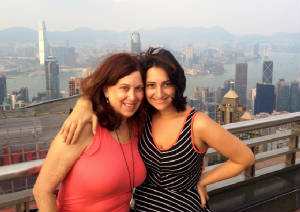 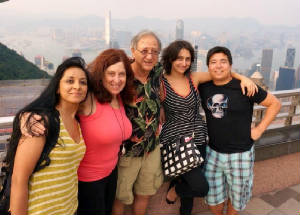
We taxied along with a small group of their friends to The Peak, at the apex of Mount Victoria (the highest point
in this mountainous seaside city), where we took countless photos of the surrounding panoramic view, but mostly snapped each
other.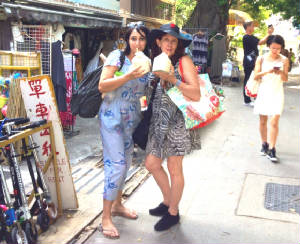
We boarded a ferry to lush Lamma Island, where we hiked and bathed in the mild yet murky waters, cooling off by sipping
fresh coconut juice straight from the shell.
We had fun hondeling (bargaining) for silk scarves, traditional
Chinese fans, and other souvenirs in the bustling outdoor Ladies' Market across the harbor in Kowloon.
But most of our activities, I must
confess, revolved almost entirely around food.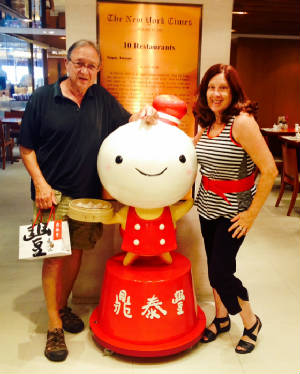
We dined on the famous soup dumplings at Din Tai Fung, located in a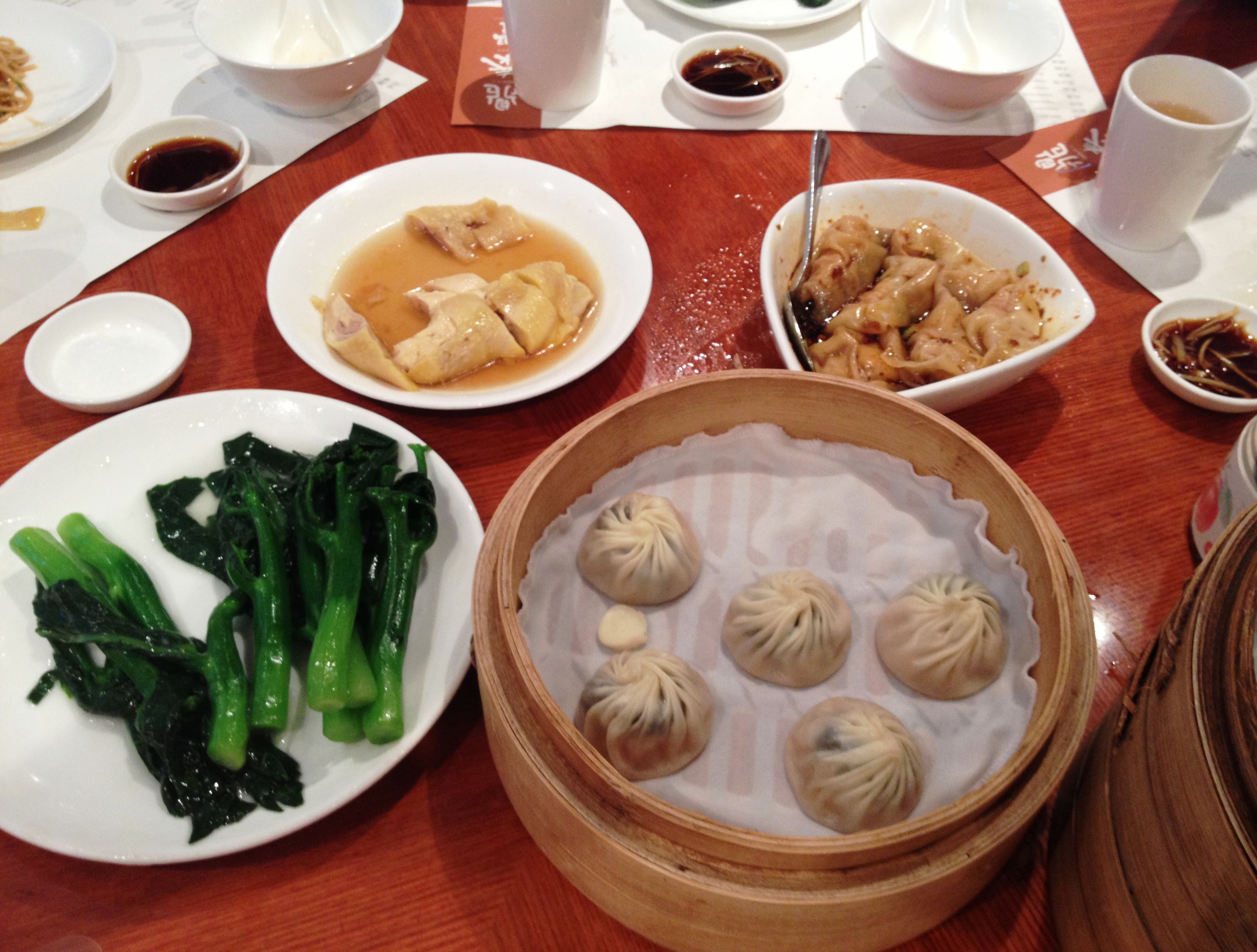 Kowloon shopping mall. (Dumplings, especially ones filled with hot broth, are big – really big -- in Hong Kong!) Kowloon shopping mall. (Dumplings, especially ones filled with hot broth, are big – really big -- in Hong Kong!)
We devoured nitrogen ice cream made right before our eyes and all manner of Asian cuisines, from spicy Thai delicacies
at a casual food court to flavorful banh mi thit and other Vietnamese specialties
at Bêp, their favorite luncheon spot.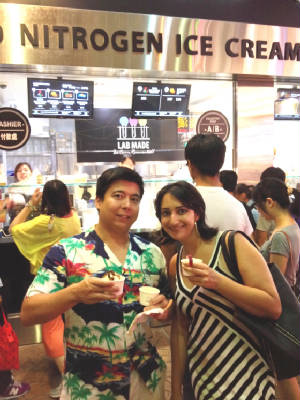
And on Sunday morning we indulged in a lavish spread of dim sum, which included not only a sumptuous variety of noodles,
dumplings, and emerald green Chinese kale, but (to my mild horror) a tiny, glistening, roasted brown pigeon, tiny head, beak,
and all.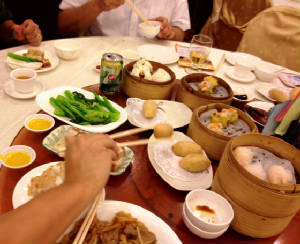
Other than that last bit, perhaps, we loved every bit of it, but mostly we relished the company we kept. After all,
I'm just a nice Jewish mom. I didn’t really care one whit what we did or where we ate, as long as we did it
together.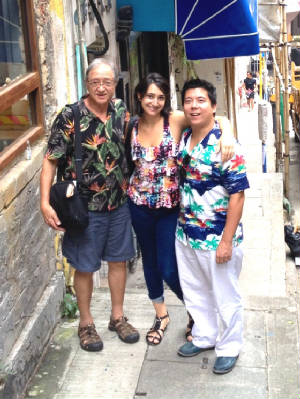
One night, en route to a stylish Asian fusion eatery in Kowloon called Spice, JP insisted that we take a brief sudden
detour. After wandering in the muggy air for hours, my husband’s shirt was notably damp, to put it delicately. JP was
worried that he would be uncomfortable in the air-conditioned restaurant and wanted him to buy another shirt.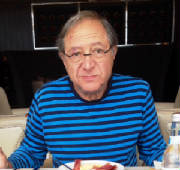
We looked at the shop’s offerings and promptly purchased a striped blue polo, but mostly we looked at each other
incredulously. For days, we had been pestering JP to teach us to say various key phrases in Chinese – “Thank
you.” “Where’s the toilet?” “How much does this cost?”
But now even English failed us, because the only word that would possibly do was “mensch.”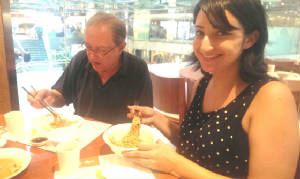
That is in no way to suggest that we were ready to give up on our terrible
"Chinglish" or consider trading in our chopsticks.
To my great surprise, instead of growing weary of
eating Chinese food both day and night, I soon found myself craving more of it… and craving nothing else.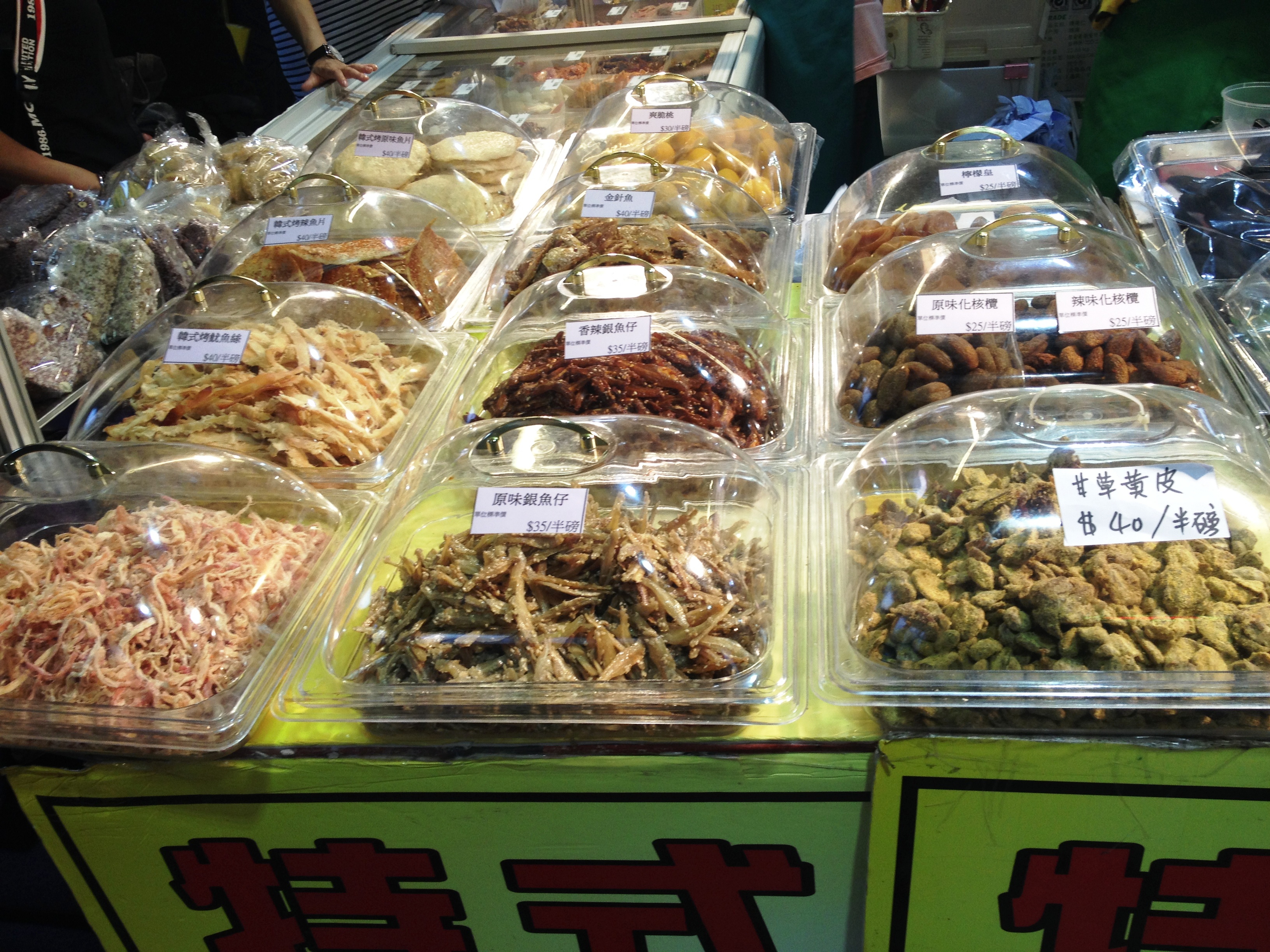
In fact, after several days of eating like the locals, we found ourselves taking our new environs happily
in stride and no longer gawking at sights like the kiosks inside the subway station, which were stocked with snacks consisting
mainly of assorted dried fish… and (I suspect) dried bugs.
And yet we still felt very far from home, particularly
on Rosh Hashanah.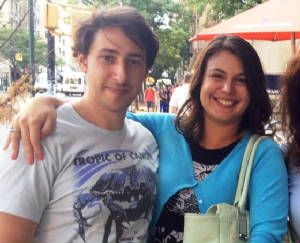
As happy as we were to celebrate the Jewish New Year with Allegra, we sorely missed being with her older brother Aidan
and his girlfriend Kaitlin. It also felt strange to be unable to attend services at our own temple, as we always do.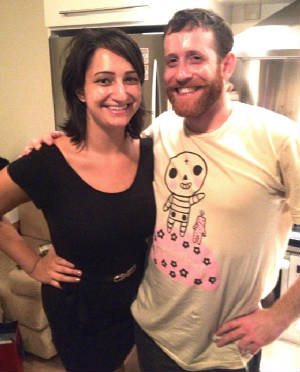
At least
Allegra's friend Matt, a nice Jewish boy from Chicago, had invited us over for a holiday dinner. Knowing this, I had carted
from home a big braided challah, some extra wide egg noodles to make a kugel, and a pair of white Shabbat candles from my
synagogue.
We’d
agreed that under the circumstances, the meal alone would suffice as a way to observe the holiday. But when we woke up
that morning, Allegra reconsidered.
"I feel weird we're not in temple," she texted to me.
"Me too!" I texted back.
So we
set off across town in search of the Ohel Leah synagogue, a modern orthodox congregation that serves as the epicenter
of Hong Kong's Jewish life.
We traipsed up and down steep, narrow streets and alleyways in the brutal heat, but we simply couldn't
find it. It was so humid and it seemed so hopeless that we were tempted to give up. Then again, how in good conscience could
we? At last, after arriving at what we thought was the right address but seeing no sign of a synagogue, we asked a guard in
uniform. He pointed to what looked like a posh apartment building sequestered behind formidable iron gates.
That was a synagogue? Who knew?
A lean and somewhat belligerent Israeli-sounding man
interrogated us. Who were we? Why were we there?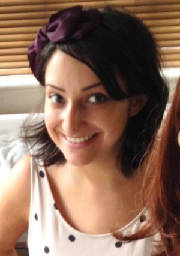
Never mind that we were two very sweaty alta cockers (old fogies)
and a nice Jewish girl in a pretty beige polka dot dress with a silk bow in her hair. He demanded to see our passports and
made us open our handbags for careful inspection.
Satisfied at last that we were "there for the right reasons," as they say
on the TV show The Bachelor, he informed us that holiday services had just concluded, but we were welcome to join
them for the kiddush.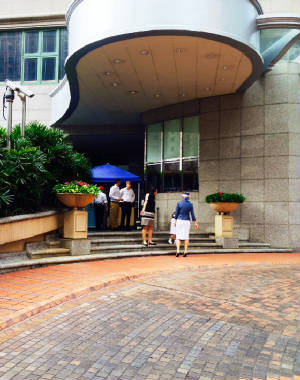
I assumed
this meant a thimble full of ritual wine and bit of challah. But after descending three floors into the safely secluded social
hall, we stepped into a vast banquet room to see several hundred well-dressed Jews seated at round tables for ten.
We quickly found seats at a corner table with a young
Israeli ex-pat couple -- a diamond merchant and his pregnant wife -- and then the feast began.
I thought it was a simple vegetarian meal with assorted
salads, challah, and couscous, but then the wait staff carried in platters groaning under pounds of brisket and roast
potatoes, and when we had eaten our fill of this, they planted a plump roasted pullet on every table. Then came honey cake
with non-dairy ice cream for dessert.
It was all delicious. But oy! How would we ever eat dinner at Matt’s now?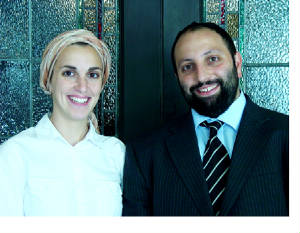
After
belting out the Birkat Hamazon (the prayer after eating), the rabbi came over to greet our family personally, and
told us that his very first pulpit had been in Norwich, CT, not far from where we live now.
Small world when you are a Jew!
Then the rebbetzen, his wife, with multiple
children clinging to her skirted suit, came over to meet us as well and to recruit Allegra for their young professionals social
group, noting that they had many single Jewish men who were members, but “not so many single Jewish women.”
After bidding
our many new friends goodbye, we spent the afternoon wandering the streets, trying to work up an appetite as we slowly gathered
the ingredients for dinner.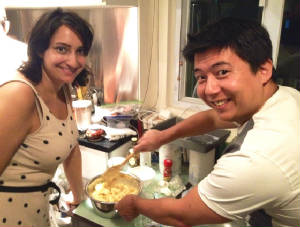
Then
we joined JP and went to Matt's apartment to help prepare yet another meal.
This one, though, would be a little less traditional.
I
had brought that bag of Manischewitz wide egg noodles from home, fully prepared to help Allegra make a lukshen kugel
using the recipe listed on my web site. However, it turned out that they expected me to whip up some matzah ball soup
as well.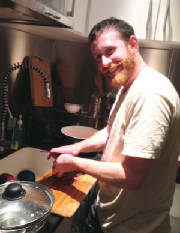
Noting
this, Matt proffered a round canister of matzah meal.
"Do you have shmaltz?" I asked, referring to the chicken fat traditionally
used in the dough. "Seltzer? How about an onion?"
None of the above, he admitted sheepishly. But he did have some dark greenish duck fat
rendered from the duck stock he’d made the night before, which would serve as the base for my soup.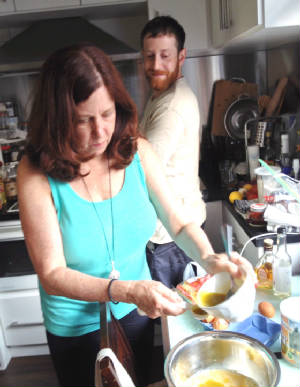
I didn’t
have the recipe I always use, the one that had been handed down from my great grandmother to my grandmother to my mother to
me. But that was the least of my challenges. Matt’s kitchen wasn’t even equipped with measuring cups or spoons.
Yikes!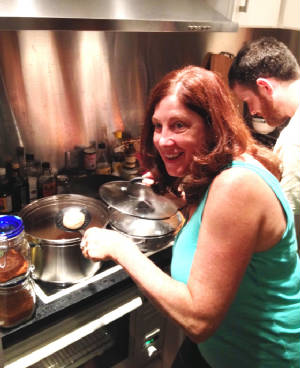
Without
a recipe, several key ingredients, or much of the necessary equipment, I simply would have to improvise. No matter. We had
matzah meal and eggs. And using the duck fat, baking powder to add leavening, and onion powder in place of the onions I usually
use to infuse flavor, I did my best to create a mixture with the right basic consistency.
And to my relief, the balls I made puffed right up and
floated to the top of the pot.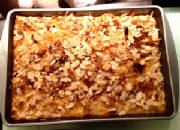
Meanwhile, Allegra whipped up a luscious noodle kugel topped with toasted
almonds, with JP serving as sous chef.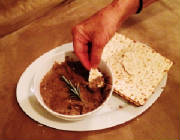
The
chopped duck liver that Matt had prepared and served with matzah may not have been quite kosher.
Neither was the mammoth brisket that he slow-roasted on a gas grill, nor his tsimmes, created from carrots,
purple Chinese sweet potatoes, and plump red dates, exactly what Grandma used to make.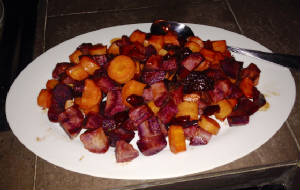
But
we consumed it all at a table on the rooftop of Matt's building, by the light of the moon and those white tapers that I’d
brought, which we anchored into two empty beer bottles in lieu of candlesticks. And as the five of us sang the blessings over
the candles, wine, and bread, I would honestly say that I'd never felt closer to G-d... or home.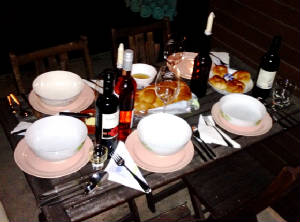
Next
week: Our Asian adventures continue in Beijing and beyond.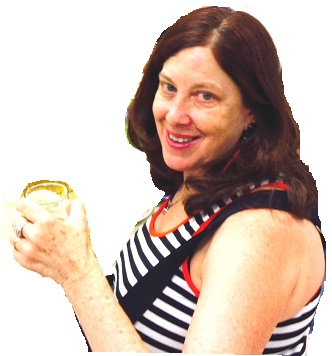
4:13 pm
|
|
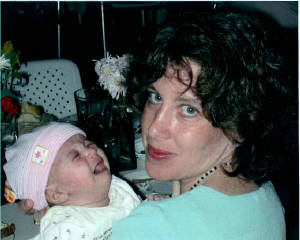
|
| That's me. The redhead on the right. But that is NOT my baby. |
No, sir, that's not
my baby. How could any mother smile beatifically while her own child wailed? Never mind that neither of my offspring
ever cried so plaintively, as far as I recall (not while I was there to nurture them through their every perceptible
need... although my son still complains that I often dressed him in garish and girlish color schemes, scarring him FOR LIFE). Besides, I'm distinctly beyond prime
delivery age ("Kitchen's closed!" as my mother might say), and my kids had departed the diaper stage by the
dawn of the Clinton Administration. Now in
their 20s, both are currently living on their
own, in not-too-distant cities, although each manages to phone me daily. In fact, to be exact, several times a
day, then sometimes text me, too. (That may sound excessive, and emotionally regressive, but I subscribe to
the Jewish mother's creed when it comes to conversing with kinder: Too much is never enough.)
Two demanding decades spent raising two kids who are kind, highly productive and multi-talented, who generally
wear clean underwear (as far as I can tell), and who by all visible signs don't detest me are my main credentials
for daring to dole out advice in the motherhood department.
Presenting myself as an authority on all matters Jewish may be trickier to justify. Yes, I was raised Jewish and am biologically an unadulterated, undisputable, purebred Yiddisheh
mama. I'm known for making a melt-in-your-mouth brisket, not to mention the world's airiest matzah
balls this side of Brooklyn. My longtime avocation is writing lyrics for Purim shpiels based on popular Broadway productions,
from "South Pers-cific" to "The Zion Queen." Then again, I'm no rabbi or Talmudic scholar. I
can't even sing "Hatikvah" or recite the Birkat Hamazon. Raised resoundingly Reform, I don't keep kosher, can
barely curse in Yiddish, and haven't set foot in Israel since I was a zaftig teen. Even so, as a longtime writer and ever-active
mother, I think I have something to say about being Jewish and a mom in these manic and maternally challenging
times. I hope something I say means something to you. Welcome to my nice Jewish world!
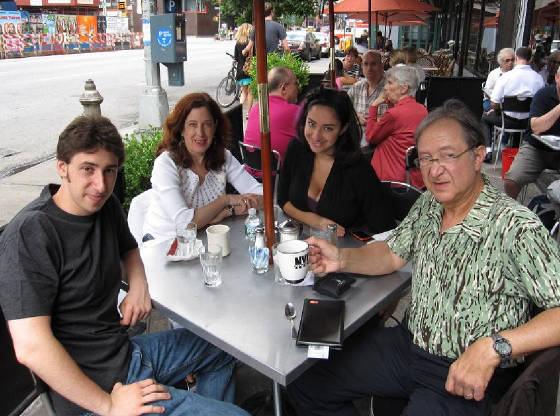
|
| LEVYS! MEET THE LEVYS! WE'RE A MODERN JEWISH FAMILY... |
In coming weeks, I will continue
posting more personal observations, rants, and even recipes (Jewish and otherwise). So keep reading, come back often,
and please tell all of your friends, Facebook buddies, and everyone else you know that NiceJewishMom.com is THE BOMB!
********************************************* The family that eats together (and maybe even Tweets together):
That's my son Aidan, me, my daughter Allegra, and Harlan, my husband for more than 26 years, all out for Sunday brunch on a nice summer weekend in New
York.

|